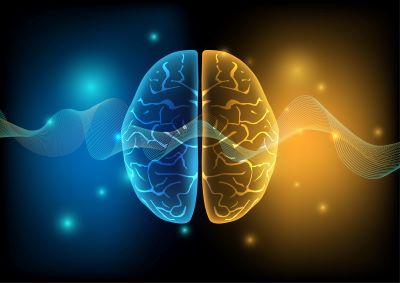The Power of Brain Network Stimulation for Mood Disorders
The Power of Brain Network Stimulation for Mood Disorders

Dr. Alik Widge, a Minnesota-based psychiatrist and biomedical engineer, wants to build a world where people suffering from mental health illnesses are able to regain control of their brains.
Sounds like a premise for a good science-fiction novel but Alik Widge, MD, PhD, who was called a “clinical brain engineer” in a TEDx Talk about healing mental illness through brain network stimulation, isn’t writing fiction. Dr. Widge presented at ADAA’s 2023 conference on how he believes “mental disorders are brain network disorders” and how treatments like Deep Brain Stimulation (DBS), Vagus Nerve Stimulation (VNS) and Transcranial Magnetic Stimulation (TMS) are quite possibly the wave of the future for certain mood and anxiety disorders, and particularly those that are treatment-resistant.
In his conference session, Direct Electrical/Magnetic Brain Stimulation for Mood Disorders (while not the most interesting title, it was indeed a fascinating topic), Dr. Widge said he practices traditional clinical psychiatry but also uses engineering principles to help treat mental illness.
Think of a Computer and All its Parts
More common treatments for anxiety, depression and other mood disorders tend to be medication or therapy, or even a combination of both. Dr. Widge says these treatments, while helpful for many, treat the disorder indirectly.
DBS, TMS and VNS, on the other hand, are what he calls “circuit treatments” that directly target the brain. To make sense of neuromodulation, or technology that acts directly upon nerves, Dr. Widge refers to a computer.
“Think about the brain as a computational engine composed of interactive sub-parts that pass messages back and forth – a lot like a computer does,” he said. “For our minds to function, communication has to happen in the brain network among all these parts.”
Dr. Widge believes mental illnesses occur when that communication breaks down and that there is a sort of loss of control in a part of the sufferer’s brain. He refers to someone with substance abuse disorder where the person living with the addiction feels controlled by their craving. There is no flexibility in the person’s thought pattern, he says, and that inflexibility is seen in a variety of mental illnesses.
What Do the Treatments Involve?
Dr. Widge’s patients are often treatment-resistant, suicidal, psychotic, or catatonic and his evidence-based lab work and treatments with brain network stimulation have proved effective, though success rates vary. His work has shown that through these treatments, the “stimulations that cause change in the brain build up” and over time and numerous treatments, for example of DBS, lasting change can result.
“Clients with incredibly treatment-resistant depression have responded well to deep brain stimulation,” said Dr. Widge in his conference session. “It is invasive, requiring a long surgery and a hospital stay, but it’s basically a ‘brain pacemaker’ that delivers constant stimulation.”
VNS is another invasive treatment that also requires surgery to implant a small stimulator under the skin in the chest area which targets the vagus nerve. The vagus nerve sends signals from the gut to the brain.
“It’s a minimally invasive implant and it works but it’s slow,” Dr. Widge explained, “so it is often an adjunct therapy. Some side effects like exercise intolerance and voice changes occur.” He adds that it has about a 66 percent response rate.
Transcranial magnetic stimulation (TMS) is also slow and uncertain, says Dr. Widge, with about a 50 to 60 percent success rate. It’s a daily treatment for a period of four to six weeks with about 20 to 30 visits.
“With TMS, the patient might need relapse prevention like medication or therapy but retreatment often works,” he said.
TMS, being nonsurgical, is regarded as safe but it too can have some non-serious side effects, including discomfort during treatment and headaches or dizziness.
Limitations, But Sometimes Lifesaving Treatments
Nearly a billion people worldwide are living with anxiety, obsessive-compulsive disorder, post-traumatic stress disorder, addiction, depression or another mood disorder, and one million of them die by suicide every year. Dr. Widge estimates around 1.5 million Americans try to kill themselves on an annual basis.
These treatments, according to Dr. Widge, are all expensive, logistically complex, and there are always risks, particularly for the invasive options. Each treatment comes with its own set of side effects, protocols and timeframes, and with no guarantee of success.
“But they’re better than doing nothing,” said Dr. Widge, “and when they work, they change someone’s life, often forever.”



















